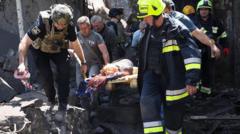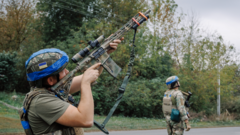On May 8, 2025, as Russia celebrated the 80th anniversary of Victory Day—the surrender of Nazi Germany in World War II—the atmosphere in the occupied Ukrainian territories told a different story. In Bakhmut, a town that once thrived with a population of around 70,000, celebrations appeared muted, with remnants of destruction overshadowing any festive spirit.
Victory Day in Occupied Ukraine: A Quiet Commemoration Amidst Ruin

Victory Day in Occupied Ukraine: A Quiet Commemoration Amidst Ruin
Celebrations for Russia's Victory Day in occupied regions of Ukraine reflect a stark contrast to the festivities in Moscow, showcasing Russian control over captured territories.
Russian soldiers stationed in Bakhmut posted videos online featuring them decoratively embellishing the town with posters that echoed sentiments of pride and remembrance. Phrases like “Happy Victory Day” and “80 years of the Great Victory” adorned the landscape, apparently curated by Russian officials to symbolize control. However, the visual evidence of their efforts was poignantly contrasted by Bakhmut's grim reality—a bombed-out ghost town, largely uninhabitable and eerily quiet.
The local leader, Denis Pushilin, appointed by Moscow to oversee the Donetsk region, announced plans for numerous celebrations across the occupied territories, intending to host over 57,000 events in honor of the holiday. Yet, these celebrations were expected to be small-scale, characterized by modest concerts and parades amidst the rubble, reflecting an atmosphere far detached from the grandeur planned in Russia, where President Vladimir Putin aimed to demonstrate a revival of Soviet strength.
In Russian media, Victory Day is imbued with significant political symbolism, serving as a backdrop for Putin's narrative that portrays Russia as the successor to the Soviet Union's legacy of triumph. The contrast of celebratory ambitions in Russia with the grim and limited observances in occupied areas vividly illustrates the ongoing struggles of the region, where war continues to loom over commemorative festivities.
The local leader, Denis Pushilin, appointed by Moscow to oversee the Donetsk region, announced plans for numerous celebrations across the occupied territories, intending to host over 57,000 events in honor of the holiday. Yet, these celebrations were expected to be small-scale, characterized by modest concerts and parades amidst the rubble, reflecting an atmosphere far detached from the grandeur planned in Russia, where President Vladimir Putin aimed to demonstrate a revival of Soviet strength.
In Russian media, Victory Day is imbued with significant political symbolism, serving as a backdrop for Putin's narrative that portrays Russia as the successor to the Soviet Union's legacy of triumph. The contrast of celebratory ambitions in Russia with the grim and limited observances in occupied areas vividly illustrates the ongoing struggles of the region, where war continues to loom over commemorative festivities.





















